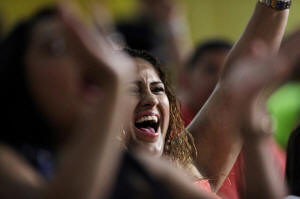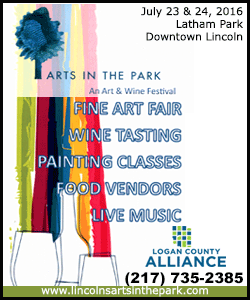|
Puerto Rico's baseball love gets major league cold shoulder
 Send a link to a friend
Send a link to a friend
 [June 15, 2016]
By Nick Brown [June 15, 2016]
By Nick Brown
SAN JUAN (Reuters) - When the ball
cracked off Cariduros shortstop Luis Mateo's bat, driving in the
eventual winning run in a crucial June 4 play-off game, Angel Mulero
and his family didn't just cheer.
They broke out panderetas, tambourine-like percussion instruments,
rapping out synchronized beats that sent Fajardo's Concepcion Perez
Alberto Stadium into frenzied dance.
Cariduros players receive no salaries, they're not famous, and most
have day-jobs. Yet the 43-year-old Mulero attends every game — home
and away. "Baseball is therapy," he said in Spanish, hoarse from
cheering.
He's not alone: Puerto Rico's so-called Double-A amateur baseball
league, where Fajardo Cariduros play, drew some 400,000 fans last
year, notable on a mostly rural island of 3.5 million. The league
has 42 teams, while a government-run Single-A league has another 89
teams — all crammed into a market about the size of Connecticut.
But for an island where baseball borders on religion, Puerto Rico,
the birthplace of hall of fame outfielder Roberto Clemente, is
struggling to maintain relevance at the sport's professional level,
which is increasingly dominated by Latin American talent.
Fewer Puerto Rican prospects are reaching the top tier U.S. teams,
and the island's own pro league is a shell of its once-vibrant self.
 Part of the reason for the stagnation: the island's relationship
with U.S.-based Major League Baseball (MLB), a complex link in some
ways reflective of the identity struggle at the heart of Puerto
Rico's status as a U.S. territory.
A policy change in 1990 forced Puerto Ricans, who are American
citizens, to enter a draft that requires them to graduate high
school and compete for attention with top prospects trained at the
best U.S. schools.
The highly-indebted island's high poverty rate, poor infrastructure
and lack of robust school sports programs puts younger players
behind in the count right from the start against players from the
continental U.S. and foreign markets such as the Dominican Republic,
where MLB invests heavily in player development.
"We work with the system," said Ramon Orta, Puerto Rico's sports and
recreation director. "But we need MLB to work with us to create more
opportunities for our players."
'BASEBALL COLONY'
Last week's MLB 2016 draft saw 17-year-old Delvin Perez, of San Juan
suburb Loiza, picked 23rd by the St. Louis Cardinals. He follows
fellow Puerto Rican shortstops Carlos Correa and Francisco Lindor as
recent MLB draftees.
But with MLB rosters featuring just 13 Puerto Rican players in 2015
- down from 29 in 2007, and a fraction of the Dominican's 83 -
Puerto Rico's inclusion in MLB's draft is a touchy issue locally.
A generation ago, prospects such as Perez could sign at any time
with any Major League team, just like players from the Dominican,
Venezuela and other countries.
Edwin Rodriguez, whose MLB career included a two-year stint as
manager of the Florida Marlins, remembers being signed outright by
the Yankees in 1980. "It was just like free agency," said Rodriguez,
now an MLB scout who runs a baseball academy in Puerto Rico.
 MLB policies are not the sole drivers of pro baseball's decline in
Puerto Rico. Baseball experts criticize weak marketing efforts by
local baseball leagues, the rise of cable TV and increasing
popularity of other sports. But the policies are resonate with
Puerto Ricans who see them as reflective of the long struggle over
their political status.
On an island close to economic collapse and where political parties
identify solely according to their stance on U.S. statehood, MLB's
flexibility to change its draft policy is a frustrating reminder
that Puerto Rico is caught between sovereignty and statehood.
"We're a political colony," says Double-A league director Carlos
Maysonet, "but we're also a baseball colony."
[to top of second column] |

Fans attend a baseball game between Los Artesanos de Las Piedras and
Los Halcones de Gurabo during the Puerto Rico Double A baseball
league at Las Piedras, Puerto Rico, June 11, 2016. REUTERS/Alvin
Baez

In the Dominican Republic, each MLB team has an academy dedicated to
recruiting, cultivating and then signing fresh talent. But teams
have no incentive to invest in Puerto Rican players who are forced
into MLB's first-year player draft and likely to wind up on a
competitor, Orta said.
Michael Teevan, an MLB spokesman, said the league spends "a
significant amount of money" in Puerto Rico, including contributions
to a government-run player development program and to private
baseball schools.
One such school is the Puerto Rico Baseball Academy, founded in 2002
and run by Rodriguez. It has produced major leaguers including the
Astros' Correa and Red Sox catcher Christian Vazquez.
"The first several years of the draft were a disaster because we
weren't prepared," Rodriguez said. "It's still a struggle, but we're
adjusting.”
The academy's 234 students spend half their days in class and the
other half playing ball, with some 80 percent landing scholarships
to U.S. colleges. The school stresses academics, Rodriguez said.
'THEY HAVE THEIR TVS'
Pro ball is a struggle within Puerto Rico, too, where the island's
professional Liga de Beisbol de Roberto Clemente has just four
clubs, down from six in 2012. Its attendance levels continue to
slump even after the league canceled its 2007 season to restructure
operations.
The problem, says Carlos Guilbe, a sociology expert at the
University of Puerto Rico, is that the league has lost its niche in
the marketplace.

The Double-A league provides a combination of affordability and
familiarity that the pro league cannot, selling tickets for $5.25
and staying in business by sponsoring everything from outfield walls
to player introductions.
"Now batting, presented by Mr. Pollo, second baseman Josue Colon,"
boomed Fajardo's PA announcer at last week's game. Mulero said he
knew many of the Cariduros players and routinely sees local
politicians at games.
The Clemente league, which declined several interview requests, once
attracted fans by offering top talent, luring pros from MLB, whose
offseason coincides with Puerto Rico's baseball season.
Tom Van Hyning, a Puerto Rico baseball historian who grew up on the
island, remembers watching MLB stars Tony Perez, Orlando Cepeda, and
Clemente himself. "Baseball was the only game in town in the 1960s,"
Van Hyning said.
But such players became rarer in the 1980s as the advent of MLB free
agency raised salaries, leaving players less financially dependent
on playing Puerto Rican winter ball, and MLB teams less likely to
let them. "If I'm paying you $10 million, I want to regulate you,
keep you close to me," Guilbe said.
That all adds up to a league without a compelling draw. "If Puerto
Ricans want to see great baseball now, they have their TVs," he
said.
(Reporting By Nick Brown; Editing by Daniel Bases and Alan Crosby)
[© 2016 Thomson Reuters. All rights
reserved.]
Copyright 2016 Reuters. All rights reserved. This material may not be published,
broadcast, rewritten or redistributed. |